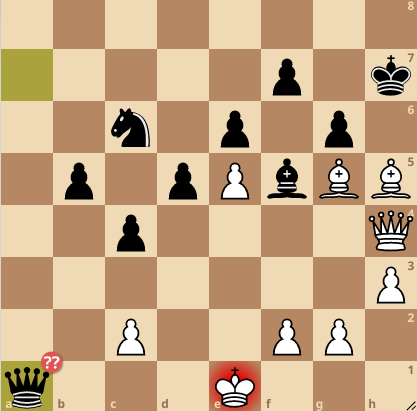the Chess Newslettr: February 2022
The 2022 Chess Grand Prix is in-progress, and Magnus Carlsen’s Champions Chess Tour re-starts soon.
Going forward, the Yevaud Newslettr plans to run a chess column every few months. Today: the in-progress 2022 Chess Grand Prix, Magnus Carlsen’s Champions Chess Tour, and thoughts on my own games.
But First: a link too good to save for Thursday: Semantle. Guess a word based on similar words. A par score is probably something between 20 and 30 guesses — and there is quite a learning curve to get there. You’re going to want to check that link out …
a Terminology Note
Competitive chess is always played with a clock. There are (roughly) 4 different names of time controls for chess.
Classical chess gives each player at least an hour (and normally two hours), plus an increment after every move. No sensible person plays classical chess over the internet1 — unless they are forced into it because of a pandemic.
Rapid chess is generally either 15+10 (15 minutes to start the game, plus 10 seconds increment per move) or 25+10. Sometimes it is 10+0 online.
Blitz chess is most often 3+2, though 5+0, 5+3, 5+5, and 3+0 are also considered blitz.
Bullet chess is most often 1+0. Sometimes it is 1+1, other times ½+0 (sometimes called hyperbullet). No sensible person plays bullet chess on a physical chess board — it is always on a computer.
At faster time controls (blitz and especially bullet), it is a reasonable and acceptable strategy to play for the flag, that is to win because your opponent runs out of time.
Generally, top chess grandmasters are good at all time controls. However, if you are not an expert, the skills involved are massively different for different time controls.
the Chess Grand Prix
As part of the qualification for the 2022 Candidates Tournament, 24 top grandmasters are participating in the Grand Prix tournament. Each participant participates in 2 of the 3 sixteen-person events. The time control is (roughly) 120 minutes plus 30 seconds per move.
The structure of the Grand Prix is still evolving, and the new innovation this year is round-robin pools of 4 players, rather than a pure knock-out structure. It is a definite improvement, but not yet perfect.
The top two participants will qualify for the Candidates Tournament. Tai Pruce-Zimmerman of “Chess by the Numbers” has odds.
I would not consider it an “upset” if any of the top 10 players in that table qualified for the candidates. I do not plan to comment or commentate on the individual matches; Levy Rozman (GothamChess on YouTube) does better recaps2 than I could possibly do.
But because we need content: our marker is on Richard Rapport defeating Wesley So in the finals of the first tournament, and Rapport and Maxime Vachier-Lagrave eventually getting the two entries to the Candidates.
the Champions Chess Tour
Initially called the Magnus Carlsen Chess Tour when Carlsen organized it in 2020, the Champions Chess Tour features top players playing over the Internet in a 15+10 time control.
There are two structural changes this year — to minimize draws (like the infamous Berlin Endgame draw3, seen over a dozen times last year), games now give 3 point for a win and 1 point for a draw, rather than the traditional 1 point for a win and ½ for a draw. Also, the unnecessarily long knock-out stage is shortened, with the quarterfinals and semifinals taking place on one day rather than two.
Rapid chess is generally more enjoyable to watch live than classical time-control formats. The David Howell / Jovanka Hauska team is great commentary for under-2000 rated players to watch, while Peter Leko is the best of the “expert commentary” commentators.
My chess
During the pandemic, I started playing chess against my dad online. He was not good at chess, but liked the mental exercise. After he died last year, I stopped for a while. But now I’m back, with a new account.
I feel I am approaching the point of respectability in 15+10 time control — while I would get significantly better4 if I put 1000 hours into training, I’m not going to do that. I can’t beat people who are “good” at chess — but I have a good chance against anyone else.
In faster matches, I still blunder fairly regularly, and often spectacularly. I hopefully will get to the point I don’t regularly lose on time in 5+0 matches this year.
Above, one of the first games with the new account, a spectacular mess. I am black and have just blundered. Do you see the move for white?
There is “correspondence chess”, which has slightly different rules, and is played at “1 move per day” time controls. I don’t play or report on correspondence chess.
The most famous chess Youtuber is Agadmator, who has a wonderful accent and is excellent at explaining chess to beginners, but is unremarkable as a chess player or live commentator. Rozman can do live commentary, and does recaps at a pace designed for people who already know something about chess.
For reference, the Berlin Endgame Draw line is 1.e4 e5 2. Nf3 Nc6 3. Bb5 Nf6 4. O-O Nxe4 5. d4 Nd6 6. dxe5 Nxb5 7. a4 Nbd4 8. Nxd4 Nxd4 9. Qxd4 d5 10. exd6 Qxd6 11. Qe4+ Qe6 12. Qd4 Qd6 13. Qe4+ Qe6 14. Qd4 Qd6 — and the game ends by threefold repetition of moves.
As a rough estimate of chess strength — if my life depended on it, I would take my chances that I could beat IM Levy Rozman within a year. However, if my life depended on (fairly) beating Magnus Carlsen in chess in a year, I would view it as a death sentence and not bother with chess in my remaining time on Earth.



